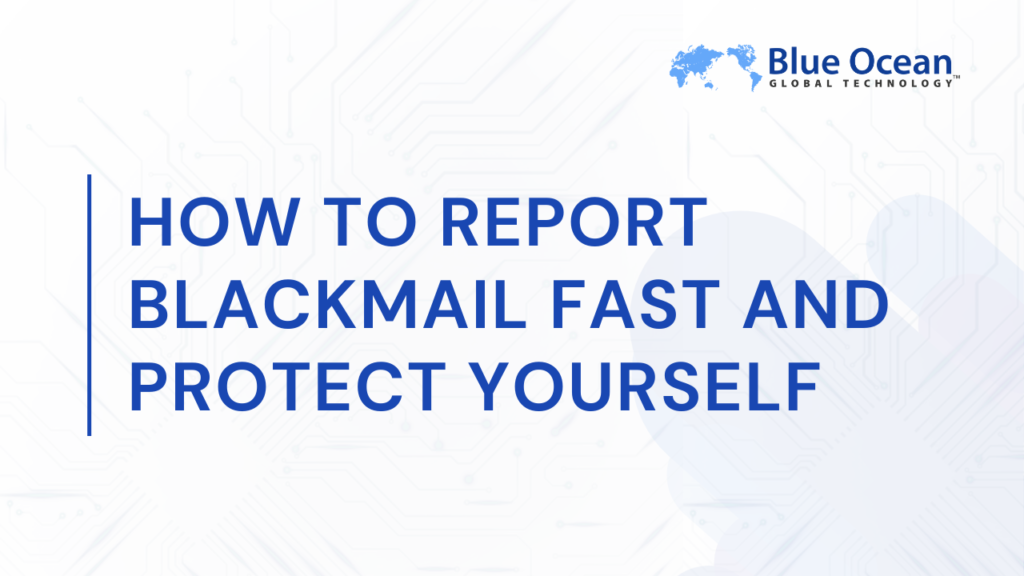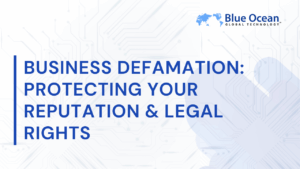Overview:
- Blackmail is a crime in which someone threatens to reveal information about someone else unless they comply with certain demands.
- It affects victims financially and psychologically
- There are some key steps to take as soon as the blackmailer contacts you
- Legal assistance and reporting blackmail are crucial to bring blackmailers to justice
Blackmail is a crime in which perpetrators threaten to share damaging information unless victims comply. They usually ask for money, but may also ask for additional content or other favors. It is usually done through social media, and teenage boys have been reported to be the greatest victims.
Victims should be aware to take action as soon as blackmailers contact them and look for help and support.
In this article, we explain blackmail, what to do when someone blackmails you, and how to stop blackmail.
Understanding Blackmail: What Is Blackmail
Blackmail is a crime in which someone threatens to reveal information about someone else unless they comply with certain demands. This information is usually embarrassing, incriminating, or damaging, and may be about their personal or professional lives or criminal activities. The blackmailer then uses this information to demand money, favors, or additional content from the victim.
It has significant impacts on the victim’s life, from financial losses to extreme psychological harm, which can even lead to suicide. From October 2021 to March 2023, the FBI and Homeland Security Investigations received over 13,000 reports of online financial sextortion of minors, which led to at least 20 suicides. This showcases how digital extortion and its impacts.

There are state and federal laws regarding blackmail, and charges and penalties differ depending on the jurisdiction and particularities of the case.
There are many ways someone can commit blackmail. For example, someone who threatens to send your explicit photos unless you pay a certain amount of money commits blackmail. It has happened even with famous people – Tom Cruise had his wedding photos with Katie Holmes stolen by a blackmailer, who demanded $1.3 million to return them.
What Are the Different Types of Blackmail and Their Impact?
There are three main types: extortion, coercion, and commercial pressure. Extortion happens when someone has information about you and uses it as leverage to force the victim to do something. For example, blackmailers can threaten to send someone’s picture having an affair to his/her family unless they can get paid. In contrast with demanding money, coercion happens when the blackmailer asks the victim to act in a particular way. An example is someone threatening to spread damaging information about a victim to coerce them to commit a crime or to keep them from ending a relationship. Commercial pressure occurs when blackmailers threaten to share a company’s damaging information to demand money from the executives.
All these tactics can be used both in the digital and offline spaces. However, our connected world and its anonymity have made online blackmail much more common. Blackmailers target people of all genders, ages, backgrounds, and digital habits. The USA, Canada, and Great Britain have recorded the highest number of victims, indicating that economic size, language, and business “culture” are major elements in shaping the regional demographics of the victims dataset.
Besides the financial impact, if a victim chooses to cooperate with the blackmailer, the psychological impacts are tremendous. Victims live in a constant state of anxiety, not knowing if the blackmailer will share their damaging information or reappear asking for money. They think they have done something wrong themselves and usually take time to reach out to someone for help. In extreme cases, blackmail has even led victims to commit suicide.

What Is the Difference Between Sextortion and Extortion?
Extortion happens when someone demands money by threatening to harm someone else if they don’t do what they ask. For instance, someone threatens to tell the immigration office that someone entered the country illegally unless they give them money. Under most state laws, this would be considered extortion. Sextortion happens when blackmailers use the victim’s sexual images to threaten and extort them. Blackmailers, in this case, usually ask victims to send more photos, sexual favors, or money. Although former partners can commit sextortion, this crime is most commonly committed by online strangers. Most cases take place on social media, messaging, and gaming apps.
Besides the psychological consequences, sextortion victims face social consequences, including embarrassment, fear of discrimination, and fear of losing their jobs. This also makes them less likely to report sextortion cases to the authorities.
Blackmail Involving Minors vs. Adults
Although age is not a big factor for blackmailers to approach victims, minors are a higher target. Young people are more present on social media and more likely to interact with people. They spend a lot of time on the internet, and this is how they socialize and interact with others. If someone has shared interests or plays the same game as them, kids will likely interact with them. Kids don’t often consider these people as strangers and may develop a rapport with them.
Sextortion victims are usually males aged 14 to 17. These kids usually do not understand they are the victims, and believe they are guilty of what is happening. Because of that, they hide it from their parents, feeling ashamed, afraid, and hopeless. Minors also often isolate themselves from family and friends, and the impact can escalate to self-harm and suicide. In blackmail cases involving minors, there are some legal differences and protections from adult cases. As the government must protect minors, Homeland Security Investigations has worked with a victim-centered approach to protect children from exploitation. In 2021, HSI arrested 3,776 individuals for perpetrating crimes against children and rescued or identified 1,177 child victims of sexual exploitation and abuse. Various organizations, such as the National Center for Missing & Exploited Children, work to assist minors. Their CyberTipline gives the public the ability to report suspected child sexual exploitation, including sextortion.
Common Blackmail Methods
Blackmailers use different tactics to commit this crime and threaten their victims. Although online blackmail has evolved with advances in technology, offline methods still exist. While digital tactics include hacking, impersonation, and manipulated media, offline tactics include coercion, physical threats, and document forgery.
Below are some examples of how digital blackmail methods are applied:
- Hacking: Blackmailers will say they have hacked your devices or accounts and claim they have found damaging information. In most cases, this information does not exist, and they have not accessed your account. However, they say that in a way, victims will believe by stating facts that can be found from the victims’ digital profiles. They expect the fear of having something leaked will make victims pay without even questioning much.
- Impersonation: This tactic occurs when blackmailers impersonate someone else and pretend to be someone they are not. It usually happens in social media profiles and dating apps, in which the blackmailer uses stolen photos of an attractive person. They start the conversation with the victim, which quickly changes to sexual topics. When the victim sends sexual images, they start threatening to share them unless they receive money or more images.
- Manipulated media: Fake and manipulated content is very easy to create nowadays due to technology and artificial intelligence. Blackmailers can take a picture you posted on social media and manipulate it to generate a compromising image. They will then send you the media and threaten to share it if you don’t comply with their requests.
Blackmail via WhatsApp & Social Media
According to Europol, blackmail of children on social media has risen abruptly in the last decade. Blackmailers use sexual evidence as leverage to force victims to send further sexual content, sensual benefits, or cash. Their tactics are commonly applied on social media chats and WhatsApp. On these platforms, these images can be found by blackmailers either by users’ self-disclosure or because social media users are more vulnerable to meeting people and sharing intimate photos.
Another common victim of blackmail via WhatsApp and social media is companies. They can be subjected to blackmail on these platforms from blackmailers who threaten to tarnish their reputation in exchange for something.
How Blackmail Affects Victims
Blackmail can lead to psychological distress and even suicide. It makes victims feel anxiety, fear, and depression. They can also face social isolation and fear of confronting people. The victim’s name and family’s reputation can also be tarnished.
Among children, impacts include self-blame, sadness, low self-esteem, sleeplessness, nervousness, anxiety attacks, and difficulties at school.
What to Do When Someone Blackmails You
After understanding that you have been a victim of blackmail, it is important to know what to do and how to stop blackmail online. Taking action as soon as possible and following the right steps are crucial to ensure you have control of the case.
Critical Steps to Take When Being Blackmailed
If you are being blackmailed, there are some steps to take to mitigate threats and protect yourself. Below are some key steps:
- Do not communicate with the blackmailer
- Communicating with the blackmailer can give them more information about you that they can use to continue threatening you. Besides making you more stressed and anxious, it will motivate them to keep talking and threatening you. If you have already responded to them, cease communications as soon as possible.
- Do not pay the blackmailer
- Most victims feel like the only way out of blackmail is to pay the blackmailer. They feel so overwhelmed and scared that the information will be shared, that they just want it to go away. However, it is not guaranteed that blackmailers will stop it once you have paid them. In fact, once they know you are willing to pay, it is most likely that they will come back and ask for more money.
- Preserve all evidence
- Preserve all evidence of the blackmail. It can be the blackmailer’s profile, messages sent by them, and any other relevant material in your case. You can do so by taking screenshots of it. It will help law enforcement agents act and find the blackmailer.
- Block and report the blackmailer
- Blackmail is a form of violation of most social media platforms’ terms of service.. This makes it easier for you to block and report them to the platform, which will restrict their account.
- Set your online accounts to private mode
- If your social media accounts are not private, after being blackmailed, you must set them to private mode. This will stop the blackmailer from finding more information about you and from contacting you.
What Are the Crucial Actions to Take If You’re Being Blackmailed as a Minor (Under 18)?
If you are being blackmailed as a minor, there are some crucial actions you should take as soon as the blackmailer contacts you. The most important thing to know is that you are the victim and not the one doing something wrong. If the blackmail started because you were on an app you were not allowed to be on, and if you sent compromising content, you are still not guilty of that.
This situation is overwhelming, and blackmailers expect you to be scared and embarrassed to keep threatening you.
As a minor, you should talk about this situation to the people you trust. Parents, family members, teachers, and friends will understand your situation and support you to get help.
Urgent Steps to Protect Yourself from Blackmail as an Adult (18 and Above)
Responding to a blackmailer’s threats is not advisable. Contact professionals who can help you in this situation, such as law enforcement agents and legal assistance. If you have already communicated with them, you should stop it immediately and reach out for help. At first, you may think that ignoring a blackmailer might make things worse, but that is not true. When they know they have leverage over you and that you might be open to complying with their demands, they will rarely leave you alone.
In this case, what you should do is to document evidence properly. Do not delete anything, and take screenshots of all the evidence regarding the blackmail. Law enforcement agents will need it to find and bring the blackmailer to justice. It can also help you recover damages.
Strengthening Digital Security
People are more vulnerable to becoming victims of blackmail because of their tendency to share sensitive and private information online. For this reason, social media users must know how to strengthen their digital security. You can do so by enhancing your privacy settings on all platforms and choosing a strong password that will keep your account protected. Monitoring your online presence and securing your digital footprint will allow you to know what the internet is saying about you and take action as soon as a situation arises. To safeguard against future threats, utilize cybersecurity tools that will identify risks and also protect your online accounts. Even if you have not been a victim of blackmail, following these steps will make your digital presence more secure.
If You Are Being Blackmailed, Know You Are the Victim.
Our qualified team of professionals can help you in every step of this situation and stop blackmail.
Legal Actions Against Blackmail: How to Report & Stop Blackmail?
Blackmail has extreme impacts on one’s life and requires support from family and friends. Although reaching out to your trusted ones may help you cope with it psychologically, having a professional help you on how to report and stop blackmail is often a good choice. They can advise you on the legal actions against blackmail and help you overcome it.
How the Law Defines & Punishes Blackmail
Blackmail is illegal and a serious crime. It is recognized under federal and state laws and may be addressed differently across jurisdictions.
The 18 U.S. Code § 873 directly addresses blackmail, stating that whoever, under a threat of informing, demands money or other valuable things, shall be fined or imprisoned not more than one year. Another federal statute, the Hobbs Act, 18 U.S.C. § 1951 handles extortion by threats affecting commerce.
State laws can differ in defining blackmail and its penalties, but it is usually considered a form of extortion.
Besides laws specifically regarding blackmail, blackmailers may also face additional charges. As they may have committed other online crimes before blackmailing the victim, online blackmail falls under cybercrime laws. In sextortion cases, additional federal and state laws may be applied, including sexual assault and coercion. In cases in which the victim is a minor, child pornography charges will be enforced.
How to Report Blackmail & Seek Legal Help?
Reporting blackmail to law enforcement agencies is important to keep the blackmailer from contacting you and from blackmailing others. It is also a way to keep you safe and bring these criminals to justice.
If you are in the United States, there are many agencies you can report blackmail to. They include the local police, the FBI, the Internet Crimes Complaint Center, the NCMEC (when minors are involved), and Interpol.
Consulting a lawyer is a good choice. An experienced professional will know what to do in these cases and take action to protect you and your image. Involving legal representation can also help you understand what kind of damage you suffered and how you can sue the blackmailer for it. Lawyers will also advise you on what evidence is needed for a strong case against a blackmailer, such as their profile and screenshots of threatening messages.
How Can Blackmail Victims Cope Psychologically and Find Emotional Support?
In an overwhelming situation, blackmail victims must manage to cope psychologically with it and find emotional support.
Telling someone you trust is a great step in managing the emotional toll of blackmail. Having a trusted friend or family member to talk to and remind you that you are not alone can be helpful. It will make you more comfortable to seek legal help and take some of the leverage from the blackmailer.
Since victims usually feel anxious and stressed, it is important to take a moment to take a deep breath and know that you will go through it. It is not an easy task, but it will help you clear your mind to take better actions and approach the situation with more control.

How to Prevent Blackmail in the Future?
To prevent blackmail in the future, be cautious of your online presence. Taking proactive online reputation management and cybersecurity measures can also decrease the chances of blackmail. Below are some tips to prevent blackmail:
- Set your accounts to be as secure as possible. Strong passwords and two-factor authentication must be used on all accounts to prevent hacking
- Avoid sharing sensitive content, especially with people you do not know
- Be careful with suspicious links and messages. If it is from an unknown website or person, avoid clicking and engaging with it.
What Are 4 Effective Ways to Strengthen Your Digital Security Against Blackmail?
Although there is no way to entirely ensure that you won’t be blackmailed, there are some effective ways to strengthen your digital security against blackmail. Check them out below:
- Be selective with what you share online and who you share it with. If you share about everything, including compromising and private information or pictures, blackmailers will have more leverage over you.
- Be cautious when meeting unknown people online. Be suspicious if someone you don’t know starts following you on social media and sends you messages. Ignore or block them as soon as they start talking about suspicious subjects.
- Know that people you meet on the internet may not be who they say they are. Blackmailers often use images of other people or manipulate images to appear to be someone they are not and trick you. Be careful not to be tricked by that and share information with criminals.
- Be aware that social media posts never just disappear. Once you post something online or send it to someone, there is no way to guarantee it will go away forever, even if you delete it seconds after. The person who has received it may send it to someone else or save it to their device, and you will have no control over it.
How to Stay Safe from Sextortion & Online Threats?
Hackers can use leaked data for blackmail, and anything you have on your devices or send to someone can be accessed by them. To avoid this kind of situation and stay safe from sextortion and online threats, make sure to:
- Use stickers or tape to cover the camera on your devices.
- Avoid sharing any kind of compromising or sexual images.
- Be mindful of the images you have on your devices, even if you haven’t shared them with anyone.
- Ensure your social media privacy settings are as private as they can be.
If you are a parent or legal guardian of a minor, there are extra measures you should take. For stronger protection, keep all electronic devices used in common areas and install parental controls on the apps they use. Monitoring the apps and websites they access and the people they talk to is also advisable.
Conclusion
Blackmail is a crime that is constantly affecting people’s lives on social media. This crime is recognized under both federal and state laws, and the community should work together to bring perpetrators to justice and stop blackmail. Although this crime highly affects victims, there are ways they can look for support and legal assistance to get over this situation. Social media users must utilize these platforms cautiously to avoid getting contacted by blackmailers, and parents should take extra care of their kids’ online social presence.
Frequently Asked Questions
1. What is blackmail?
It is a form of extortion where someone threatens to reveal harmful information unless their demands are met. It typically involves coercing the victim by threatening to expose embarrassing, damaging, or private information or pictures. It is considered a crime in many jurisdictions.
2. How can I stop blackmail?
If you are being blackmailed, it is crucial to take immediate action. Contact law enforcement to report the crime and provide any evidence, such as communications, threats, and the blackmailer’s profile. Additionally, seek legal counsel to understand your rights and explore further actions.
3. How to prevent blackmail?
To prevent blackmail, ensure your accounts are as secure as they can be, and avoid sharing sensitive content. Always be careful with strangers online, as they may not be who you think they are.
Is Someone Threatening to Share Your Explicit Photos Online?
Contact us today to learn how you can protect yourself!















